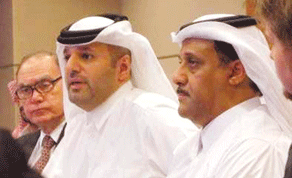 |
| Dr al-Thani speaks as Djerejian (left) looks on |
Hamad Bin Khalifa University president and QF’s vice president of education, Dr Abdulla bin Ali al-Thani, welcomed the students at the Qatar National Convention Centre. He was joined by the founding director of the James A Baker III Institute for Public Policy at Rice University and former US ambassador, Edward P Djerejian, who delivered the opening address.
The objective of the forum, held parallel to the 2012 Qatar International Conference on Stem Cell Science and Policy, was to share knowledge and opinions on science, society and globalisation.
Dr al-Thani opened the discussion by emphasising the importance of having an international perspective in education. “The universities represented at QF are globally recognised academic institutions, which help to prepare the students to compete and integrate into the global marketplace,” he said.
Djerejian spoke extensively on QF’s investment in the country’s future generations by creating opportunities through education, science and research.
“Qatar has become a successful example of Arab foreign policy,” he said while observing that Qatar is one of the few countries in this part of the world that has made the decision to invest in developing a society based on knowledge.
“The country’s leaders are not sitting down satisfied with what today’s landscape looks like, but are looking towards the future and working to transform the country into a knowledge-based economy for future generations.”
Rice students engaged in discussions with the Qatar-based students on key issues, including scientific diplomacy, modern research, ideas to promote future scientific collaborations between the US and Qatar and the importance of making science understandable if the public are to be better informed.
Roundtable discussions took place on topics including religion, secularism and interfaith dialogue; the Arab Spring and the role of social media; the future of development for knowledge-based economies; and understanding and discussing cultural misconceptions.
The colloquium illustrated that the James A Baker III Institute for Public Policy is not only engaging renowned experts in science but also encourages the participation of younger generations in open discussions on the importance of science and research for public diplomacy.
QF’s research training and development head, Dr Ayman Bassil, observed that the sessions reflected Qatar Foundation’s significant emphasis on the role that youth play in building a bright, peaceful future around the globe.
“These interactions and dialogues have a major impact on their mutual understanding and tolerance - not only in the field of politics, but also in sciences and economics. The students at the colloquium were from different academic and cultural backgrounds, which enabled rich contributions to the different issues related to sciences, economics, media and politics.”
QF research division’s senior analyst Aisha Ghanim, who helped organise the colloquium stated that such sessions should be highly valued around the world for their contribution to creating future leaders who will be fully aware of the needs and hopes of people in other parts of the world.

